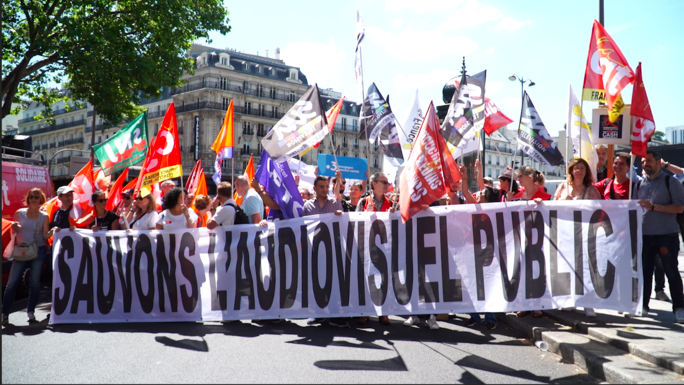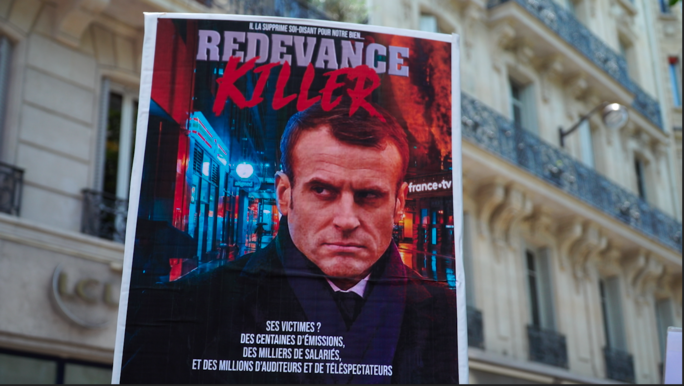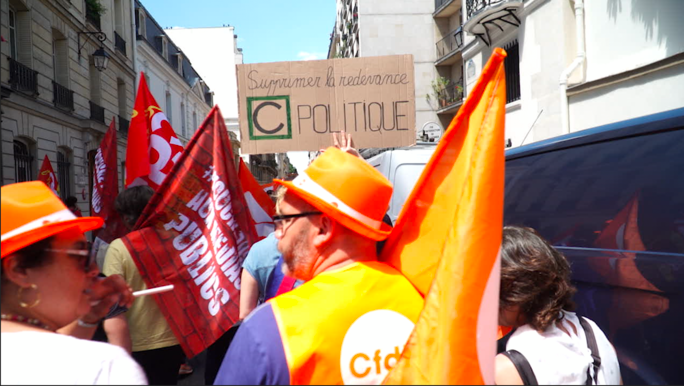On Saturday July 23rd the National Assembly voted by 170 votes to 57 to abolish France's television licence, which has existed since 1948 and currently raises 3.2 billion euros a year. The government measure, a campaign promise by President Emmanuel Macron, was passed with the support of MPs from the rightwing Les Républicains and the far-right Rassemblement National, and despite opposition from the leftwing alliance the Nouvelle Union Populaire Écologique et Sociale (NUPES). The shortfall in funding will be made up by a government grant from VAT or sales tax receipts. Leading figures in public broadcasting have warned that the move could have a serious impact on editorial independence and content. And on June 28th staff working for the country's public broadcast outlets went on strike in protest against the scrapping of the licence. At the time of the strike Mediapart's Dan Israel wrote an opinion article summarising the main concerns about the abolition of the 'Contribution pour l’audiovisuel public' or 'contribution towards public broadcasting' as it is officially known. That article is reproduced in full below.
---------------------------------------------
For several hours there was no sound or pictures. On Tuesday June 28th the majority of public service radio and television programmes and news bulletins fell silent. It was a way for journalists and technical staff to express their deep concern about the future of public broadcast outlets Radio France, France Télévisions, RFI and France 24, Arte and also the Institut National de l’Audiovisuel (INA) which looks after public archives.
Staff used this strike - and a demonstration in Paris that ended up in front of the National Assembly the day that new Members of Parliament sat for the first time – to show what they think of the abrupt axing of the television licence or 'Contribution pour l’audiovisuel public' ('contribution towards public broadcasting') as it is formally called. It was also an attempt to spark a discussion over a crucial decision affecting the future of a key source of news that has attracted no public debate.
The protest may have helped change that: as the march ended some of those taking part were in conversation with MPs on the Left, as shown by Mediapart's own report of the event (see below).
It is a crucial issue. Each year some 23 million households plus 79,000 businesses pay for the licence which currently costs 138 euros in mainland France and 88 euros in overseas territories and départements. It raises around 3.2 billion euros a year and funds most of the news and entertainment programmes of France's public service channels, not to mention the other missions reserved for public broadcasting.
But from next autumn all that will have ended. On May 11th, during the final ministerial cabinet meeting under prime minister Jean Castex, the government announced that the licence fee would not appear as usual this year on the annual tax forms that taxpayers receive. This tax, created in 1948, will be abolished by legislation to be introduced in July.

Enlargement : Illustration 2

There is huge anxiety among public broadcasting staff. And this anxiety should be shared by any citizen who is the slightest bit concerned about the quality of the media.
“We're standing up for a strong public broadcasting service,” said the unions at the demonstration. A joint statement was signed by different union branches involved, the CGT, CFDT, FO, SNJ, Sud, UNSA, CFE-CGC and CFTC. They are calling for “adequate (enough to deal with current issues), strong and progressive (to allow it to meet the challenges of tomorrow) funding” and financing which is also “permanent, with dedicated resources, and which is enough on its own to allow it to fulfil its public service missions: to inform, educate and entertain in the service of all citizens”.
Campaign promise
Scrapping the TV licence was a campaign promise made by Emmanuel Macron, who raised it for the first time in a speech on March 7th at Poissy near Paris. The head of state said the move was about reducing the tax burden for households. “I stand by its abolition, in order to help with [household] spending” and “for the sake of consistency after the abolition of the council tax,” he said on public broadcaster France Inter in April. Reforms to the taxe d'habitation or council tax were announced at the start of Emmanuel Macron's first presidency and that tax is due to end for everyone's main residence from 2023.
His stance was in line with the views of the rightwing Les Républicains and to an extent the far-right Rassemblement National, who want to see the end of the licence heralding the privatisation of part of public broadcasting.
The staff at Radio France and France Télévisions have every right to be angry. The outright abolition of the TV licence is an not idea that the government or the ruling party La République en Marche had ever floated until the sudden announcement by the president during the election campaign. One could even say it came out of the blue.

Enlargement : Illustration 3

Inside public service broadcasting it was accepted that the principle of the licence had to be reviewed, particularly as its payment was linked to that of the council tax (people exempt from paying council tax were previously automatically exempt from paying the licence, for example) which is disappearing. The licence fee is also conditional on owning a television set “or equivalent device”.
But discussions on the issue up to then, led by the culture minister at the time Roselyne Bachelot, were about how to create a new means of funding public broadcasting. People looked in particular to Germany where the licence was replaced in 2013 by a flat-rate contribution not linked to the ownership of a television. Another option could have been a new tax on electronic equipment. In a recent report for the Jean Jaurès Foundation the economist Julia Cage meanwhile proposed a specific but progressive tax, based on income levels.
A glance at neighbouring countries shows that the French TV licence is cheaper than elsewhere: a licence is 159 pounds (currently 186 euros) in the United Kingdom, where the issue is a constant source of tension between the BBC and the government, 180 euros in Denmark and 300 euros in Austria. In Germany the licence is 210 euros a year and it is left to an independent commission to assesses the level of resources required by its public broadcasters.
In the autumn of 2021 the government commissioned yet another report from the Inspection Générale des Affaires Culturelles (IGAC) – a supervisory body at the Ministry of Culture – on the issue. But Emmanuel Macron did not bother to wait for its conclusions and brushed aside its input. His proposal is simple and dangerous: to incorporate the public media budget into the state's overall budget [editor's note, under the legislation as voted through on Saturday July 23rd the money will come from a government grant using a portion of the state's VAT receipts].
Economic threat and threat to independence
This move – the details of which were never clearly spelled out - poses several risks. The first is a financial one: once there is no longer a fixed budget reserved for public media there is no guarantee that the funds needed for it to function properly will always be assured. The new culture minister Rima Abdul-Malak naturally enough guaranteed the “principle” of consistent funding in her first interview, given to Le Parisien. “The government will propose an additional guarantee making it impossible for budget reductions during the course of a year,” she insisted.

Enlargement : Illustration 4

Speaking on France Inter radio the minister also promised that public broadcasting would get “multi-year” plans so that it would know its long-term funding in advance, rather like the law relating to the funding of scientific research. But even if the current level is maintained, it is possible, even probable, that its increase will not really be a pressing concern in the future, for example, if France faces an economic crisis in the coming years.
Moreover, the government's case that scrapping the TV licence helps “protect” household spending only makes sense if it then plans to reduce the sum of 3.2 billion euros currently dedicated to public broadcasting from the licence fee. For if this sum does not go down, it makes little difference if broadcasting is funded by a hypothecated tax or by drawing on the state's overall budget; the French public will still pay the same amount.
Moreover, as the specialist consultant Philippe Bailly has noted, “the past cruelly exposes” current promises. When in 2008 President Nicolas Sarkozy scrapped evening adverts on public service television stations France 2 and France 3, he pledged to make up the shortfall in income “to the nearest euro”. He did not do so.
More recently, during Emmanuel Macron's first term the money set aside for public broadcasting dipped by 190 million euros, forcing France Télévisions to make plans to cut a thousand jobs between 2019 and 2022 and Radio France to do the same for 300 posts.
The clear risk associated with this economic dependency is, as some critics of the reform have already noted, that it makes public broadcasting barely distinguishable from just another government administration. It would be subject to a political decision-maker, not just economically but politically.
When the future method of financing public broadcasting is being chosen, it's important that this decision shields us from any suspicion.
Without its own and permanent funding public media will inevitably lose some of their independence, even their all of it. Will the boss of radio or television be in a position to resist the government if there are hints they could get their funding cut? Simply posing the question provides the answer.
The current bosses of Radio France and France Télévisions, who can scarcely be described as energetic opponents to the current government, have said as much themselves. “When the future method of financing public broadcasting is being chosen, it's important that this decision shields us from any suspicion as to our freedom, our impartiality towards politics and our independence,” said Radio France chair Sibyle Veil in a message to the media in March.
The head of France Télévisions, Delphine Ernotte Cunci, meanwhile said that guaranteed and independent funding was the “condition and the cornerstone of our independence”. The CEO of Radio France from 2014 to 2018, Mathieu Gallet, has also said that scrapping the licence fee poses a risk to independence.
This is not mere rhetoric as some Emmanuel Macron supporters appear to think. “It is not the licence itself that preserves this independence today. The president has never intervened over a programme or scheduling,” the minister of culture Rima Abdul-Malak told Le Parisien.
You could equally argue that the heads of public broadcasters are appointed by the industry body ARCOM (formerly the CSA) and that the president only had this prerogative between 2009 and 2013, at Nicolas Sarkozy's instigation. However, that would be to underplay the political stakes involved in such appointments. And it would mean forgetting that since the start of his first term relations between Emmanuel Macron and public broadcasters, and even between him and journalists in general, have not been plain sailing.
In December 2017 he described France Télévisions as a “disgrace” during a meeting at the Élysée – though the presidency denied this. Then, in July 2018, as questions grew over the Benalla affair involving his former bodyguard, he publicly attacked a “press which no longer seeks the truth” and which produced “twaddle”. Less than a year later Mediapart set out the many items of fake news proffered by the head of state and those close to him, to the detriment of the reality regularly described by the media.
Finally, right to the end of this year's presidential campaign France Télévisions noticed that the president was in no great hurry to appear before its cameras, in particular news cameras from France 2. Was this because the main France 2 news bulletin presented by Anne-Sophie Lapix, which is regularly jeered at in private at the Élysée, was judged too “critical” and “declinist”?
Broadcast designers, producers and scriptwriters are also worried about the changes ahead, pointing out that the disappearance of the TV licence also threatens film, documentary and cultural creativity. A comment article in Le Monde in mid-June co-signed by some of the cultural intelligentsia on the Left (film-makers Pascale Ferran and Agnès Jaoui, actress Julie Gayet, writer Annie Ernaux and so on) underlined how “without the enduring and safeguarded funding of France Télévisions, cinematographic production will decline and quality drama and documentaries will disappear”.
The spectre of merger
The final threat is that of a merger of the two large public service groups. In that scenario Radio France and France Télévisions would be joined, effectively recreating the old Office de Radiodiffusion-Télévision Française (ORTF), the single body governing French public radio and television that was scrapped in 1974.
This idea received some attention in the latest parliamentary report on the issue, from rightwing senators Roger Karoutchi and Jean-Raymond Hugonet, who spoke about the possibility of creating a “French BBC”. On June 28th the demonstrators in Paris expressed their deep concern about the consequences of such a merger.
The idea of a merger is not just supported by the usual suspects, however. In his book 'Jeux de Pouvoir' ('Power Games') former Radio France boss Mathieu Gallet supports a move which he considers to be “logical and necessary” to “release the synergies and strike power that is indispensable to have clout in a market where investments are increasing under competitive pressure from [other] platforms”.
The current head of France Télévisions, Delphine Ernotte Cunci, is also in favour in principle of the idea, unlike Sibyle Veil. The latter asserted in Le Figaro newspaper on June 23rd that a “new group of this size would be difficult to manage at a corporate level”.
An idea close to a merger but less systematic was put forward by the then culture minister Franck Riester in 2019. He wanted to set up a holding company bringing the two entities closer together, but the Covid pandemic stopped the idea going any further. In her interview with Le Parisien the current culture minister Rima Abdul-Malak did not close the door on this idea, simply stating that “this debate will take place” while noting that “institutional Meccano” was not her priority.
The unions at both broadcasting organisations are in any case deeply hostile to a merger which would risk seeing cutbacks in the size of editorial teams and could, one can easily imagine, ruin the diversity, not to say quality, of public media editorial output.
The scrapping of the licence is one of the first issues brought forward by Emmanuel Macron at the start of his second term and already it has attracted large and widespread opposition. It is a situation at odds with what he proclaimed as a candidate during the campaign. On March 17th he made a passionate plea for “free and independent news” which along with fiction and new creative works “shapes minds in democratic societies”.
-------------------------------------------------------------------------------
- The original French version of this opinion article can be found here.
English version by Michael Streeter


